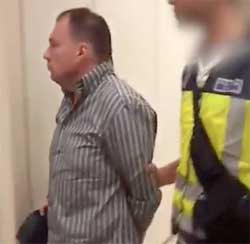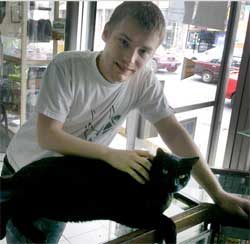NEW YORK, USA: A man accused of founding an online underworld bank that allegedly laundered $6bn for criminals, including child pornographers and drug traffickers, pleaded not guilty before a New York court this week.

Alleged money-laundering kingpin, Arthur Budovsky has pleaded not guilty to running an underground money-laundering agency for criminals throughout the world. Image:
CSIArthur Budovsky, 40, who renounced his US citizenship and acquired Costa Rican nationality in an apparent bid to avoid prosecution, faces a maximum of 30 years in prison if found guilty by a US District Court in Manhattan.
US prosecutors say he was the "principal founder" of Liberty Reserve, which operated an alternative digital currency that helped cyber criminals around the world distribute, store and launder the proceeds of illegal activity.
Budovsky is charged with conspiracy to commit money laundering, conspiracy to operate an unlicensed money transferring business and operation of an unlicensed money transmitting business.
In his first US court appearance he pleaded not guilty before district Judge Denise Cote in a 20-minute hearing, four days after he was extradited from Spain.
Budovsky, who was arrested in Madrid in May last year, wore an orange T-shirt and navy overalls, and looked glum, speaking only briefly in response to the judge's questions.
Trial set for September next year
Cote set a trial date for 21 September next year. US Attorney Andrew Goldstein estimated that the trial would last four weeks. Budovksy's lawyer Steven Frankel made no application for bail.

Whizzkid Maxim Chukharev, 27, pleaded guilty to operating an unlicenced money-laundering business. Image:
TicoTimesUS prosecutors say the Costa Rica-based Liberty Reserve laundered more than $6bn for criminals between 2006 and 2013.
On 23 September, Maxim Chukharev, Liberty's Head of Technology, pleaded guilty in New York federal court to conspiracy to operate an illegal unlicensed money transmitting business.
Budovsky and Chukharev are among seven charged in May 2013 when federal authorities announced they had shut down what was described as one of the world's biggest money laundering schemes.
Five of them are in custody and two remain at large in Costa Rica.
The digital exchange mechanism, which allowed depositors to mask their identities, was similar to Bitcoin and other digital currencies. Before being shut down, Liberty Reserve had more than a million users worldwide, including more than 200,000 in the United States.
Masquerading as legitimate business
Indictments accuse Budovsky and his partners of creating a firm that masqueraded as a convenient and legitimate money transfer system.
Prosecutors say the digital currency laundered the proceeds of credit card fraud, identity theft, investment fraud, computer hacking, child pornography and narcotics trafficking.
The investigation of the company involved police in 17 countries, including Britain, China, Russia, Morocco and Switzerland, and is believed to be the largest money laundering prosecution in history.
Budovsky was arrested in 2013 at a Madrid airport during a stopover on a flight from Morocco to Costa Rica.
He fought extradition, arguing he deserves the right to return to Costa Rica, where he obtained citizenship by marrying a snack vendor.
Source: AFP via I-Net Bridge










